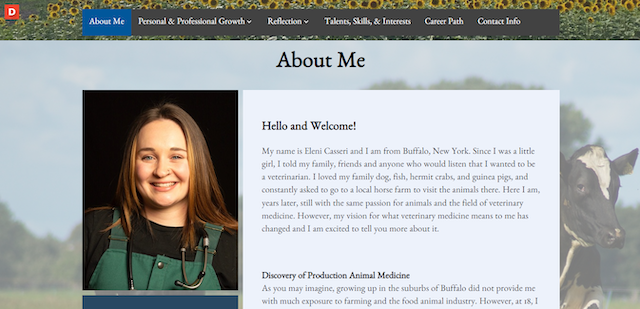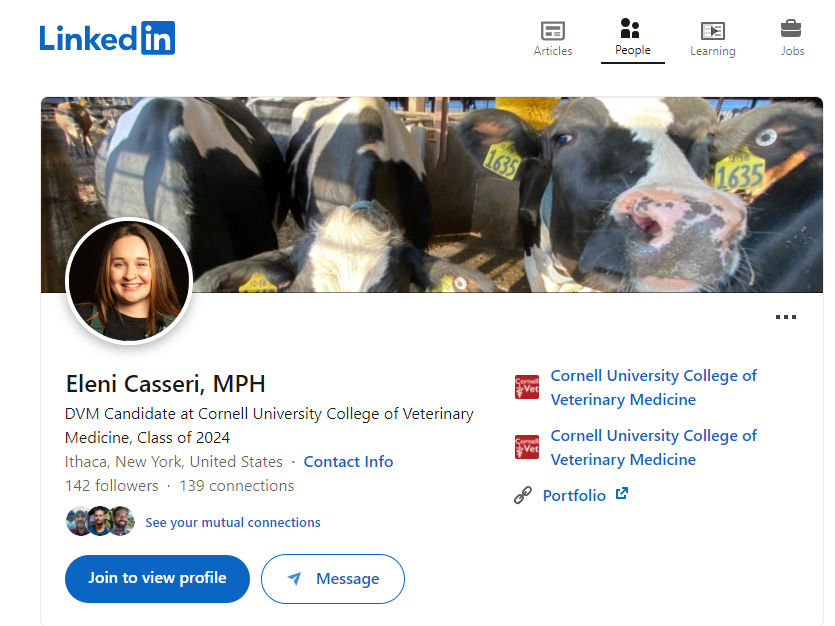Jorge Colón was on the Digication Scholars Conversations
The veterinary education industry faces challenges today, from a content-heavy curriculum that creates a gap in business and soft skills to mental health concerns and limited access to diverse clinical opportunities. These challenges present significant difficulties for career-seekers in the field.
This article discusses the power of ePortfolios in veterinary education as a valuable tool for showcasing achievements and differentiating oneself with insights from Jorge Colon. Jorge, an associate professor of practice at the Center for Veterinary Business and Entrepreneurship at the College of Veterinary Medicine, Cornell University, spoke to Jeff Yan, co-founder and the CEO of Digication.
Becoming a Highly Introspective Veterinarian
The Guayanilla, Puerto Rico native “stumbled upon” the Digication ePortfolio and assessment tool during a showcase by Pat Graham, instructional technology specialist in the Center for Teaching Innovation at Cornell University. The veterinarian, who combines his passion for business with his love for animals, tells Jeff that he’s “hooked on it now, and there are some courses that I can't live without (Digication).”
After studying biology and attending veterinary school, Jorge spent 25 years practicing in Lexington, Kentucky. During that time, he developed a keen interest in business and finance and earned a Master's in Business Administration. Today, he shares his expertise with fellow veterinarians and students.
Although his primary focus is education, Jorge still maintains his hands-on work as an equine veterinarian and enjoys teaching students about working with horses. Jorge's ultimate goal has been to help others grow and positively impact their lives throughout his career.
Challenge for career-seekers in veterinary education today.
The challenges for career-seekers in veterinary education today include:
- Gap in business and soft skills
- A lack of effective mentorship
- Difficulty in showcasing skills and accomplishments
- Mental health and high employee turnover
Gap in business and soft skills
Some professionals argue that veterinary schools need to sufficiently equip graduates with essential business and soft skills, such as communication, leadership, financial management, and client relationship building. This can make it harder for graduates to excel in various career paths, particularly business ownership and managerial roles.
Lack of effective mentorship
According to the American Veterinary Medical Association (AVMA), mentorship is the #1 reason new veterinarians accept job offers in 2022.
Aside from the fact that mentorship can be challenging to deliver in today's busy schedule, Jorge suggests that many vet practitioners need to be more effective mentors. From his experience, some practitioners responsible for training new veterinarians take a one-sided teaching approach. They focus on showing they are more knowledgeable than the learner (or customers) rather than sharing knowledge.
Difficulty in showcasing skills and accomplishments
Vet graduates may have the required skills but need help to showcase those skills effectively. This hinders the ability to differentiate themselves in the job market and makes it harder for employers to review potential candidates.
They spend time building up their resumes and showing all their certificates and qualifications when, in fact, those qualities are traditionally not the most substantial prerequisites for recruitment.
"Hiring in the veterinary space and resumes have not always gone hand in hand," Jorge says.
"In my career, other than when I applied for my job here at Cornell, when I'm 25 years after graduating from graduate school, that was the first time in my life I had ever really needed a resume.
"In the veterinary space, there's a lot of people who get hired without ever looking at somebody's resume.
"If you come to practice at my practice and visit as a student of my practice, and I understand that you understand what you're talking about, you're coachable, everything else, then you might be a great asset."
Mental Health and High Employee Turnover
The number of pet-owning U.S. households is increasing at 1.5% annually, but there aren't enough veterinarians to care for them. In fact, up to 55,000 new veterinarians are needed to meet projected demand in 2030. Why? Because veterinary teams are overworked, overwhelmed, underpaid, and quitting in record numbers.
While this abundance of jobs represents a positive for veterinary graduates, job selection requires that, beyond skill and certifications, graduates demonstrate that they possess the sheer dedication, passion, and care factor needed to succeed– which many experts say is lacking among the current crop of veterinary graduates.
I can teach you any skill. I can teach you how to suture a patient after a spay. I can teach you how to do a nerve block on an animal for a lameness exam. I can't teach you how to care. I can't teach you how to have passion for what you do. I can't teach you how to have pride in the work being done. ...Jorge Colon on the Digication Scholars Conversations.
The Power of a Vet Education ePortfolio: A Tool for Reflection, Differentiation, and Discovery
The ePortfolio is a tool that allows students to demonstrate their drive and passion beyond certification requirements. ePortfolios created in Digication allow for a more dynamic and comprehensive representation of a student's abilities and accomplishments.
It can include various multimedia elements, such as images, videos, and documents, effectively conveying the depth and breadth of a student's learning experiences. Additionally, ePortfolios can be easily shared and accessed online, making it convenient for potential employers or educational institutions to review and evaluate a student's work.
ePortfolios can give students a competitive edge in job applications or college admissions by providing tangible evidence of their skills and achievements.
How ePortfolios provide a way for students to showcase their unique qualities
ePortfolios help students showcase their unique abilities through reflective learning, which helps them stand out from their peers.
Reflective learning is a personal development tool. It involves students consciously examining and evaluating past experiences to extract meaningful lessons that can inform future actions.
According to Jorge, students who use reflection in learning and record their experiences can stand out better than recruiters because their ePortfolio showcases qualities and moral compasses that have shaped their experiences and approach to veterinary practice. That way, recruiters can decide what makes such students different from those who also took the same curriculum.
"When you read their portfolio, and then you discover through self-reflection that maybe a parent died when they were young because of something related to cancer. And that drove them to be the type of scientist they want to be in the future," Jorge continues.
"And now that who, why and why they want to be an oncologist has much deeper meaning and significance."
In addition to serving as a tool for differentiation, Jorge believes ePortfolios also function as a discovery tool. In our interconnected world, where every activity leaves a digital footprint, recruiters prefer finding information that reflects your life goals and reflections rather than casual party pictures. Without a comprehensive ePortfolio, recruiters struggle to evaluate you beyond superficial online profiles.
For instance, when recruiters Google a student's name, a well-crafted ePortfolio introduces the student and their current state. Without it, recruiters may only find a student’s's Facebook or Instagram page, which is often unhelpful.
"Your DI skills will be defined based on the job posting that you're answering in the COVID letter as you showcase to the employer why you're the best fit for that job. That's where you show the skill.
"But your why, who, what, how and the moral compass created by that skill. That's what we have in the portfolio, and that's what creates that differentiation."
Other benefits of ePortfolios in veterinary careers
- Continuous ePortfolio-based reflection can deepen student learning through their degree years.
- ePortfolio recording can help instructors and mentors identify and address gaps in knowledge or skills.
- ePortfolios and the practice of recording help students define and refine their identity and take ownership of learning.
- ePortfolio-based learning encourages regular student-tutor dialogue, which aids the development of critical interpersonal skills.
- ePortfolios serve as a job-finding tool through networking and feedback from alumni reviewers.
"I have alumni and friends of the college who serve as portfolio reviewers, providing feedback to students as part of a course that I now teach called ePortfolio," he added.
"And the end result of this portfolio feedback system by alumni of the college, et cetera, is that people finding jobs without looking for them is becoming a very common occurrence."
Veterinary ePortfolio Example To Inspire Your Creativity
Assessment using ePortfolios in healthcare education is becoming increasingly popular. If you want to create an ePortfolio in Digication, see the examples below for inspiration.
Eleni Casseri
Elenis' portfolio is colorful and vibrant. With a bold and professional profile picture and a thoughtful description of her journey into veterinary practice, Eleni uses Digication’s design and layout tools to captivate the reader with a reflection of her values and goals.

Eleni's Veterinary ePortfolio Landing Page
Another great use of the portfolio is how Eleni uses the section below her profile image to showcase her point of view on a controversial topic without condescending.
Eleni connects her portfolio to her LinkedIn profile, a great way to ensure recruiters discover the portfolio from the professional network.
Eleni's LinkedIn Profile/Resume
Boost Your Career and Personal Development with Digication Free ePortfolios
Creating an ePortfolio effectively differentiates yourself by showcasing your unique skills, experience, and personal development. Jorge encourages students to develop and update their ePortfolio, reflecting on their experiences, goals, and moral compass, seek opportunities to gain diverse skills and experiences in veterinary medicine and related fields, seek feedback on their ePortfolios from alumni and network, and use it for continuous improvement and self-regulated learning.

